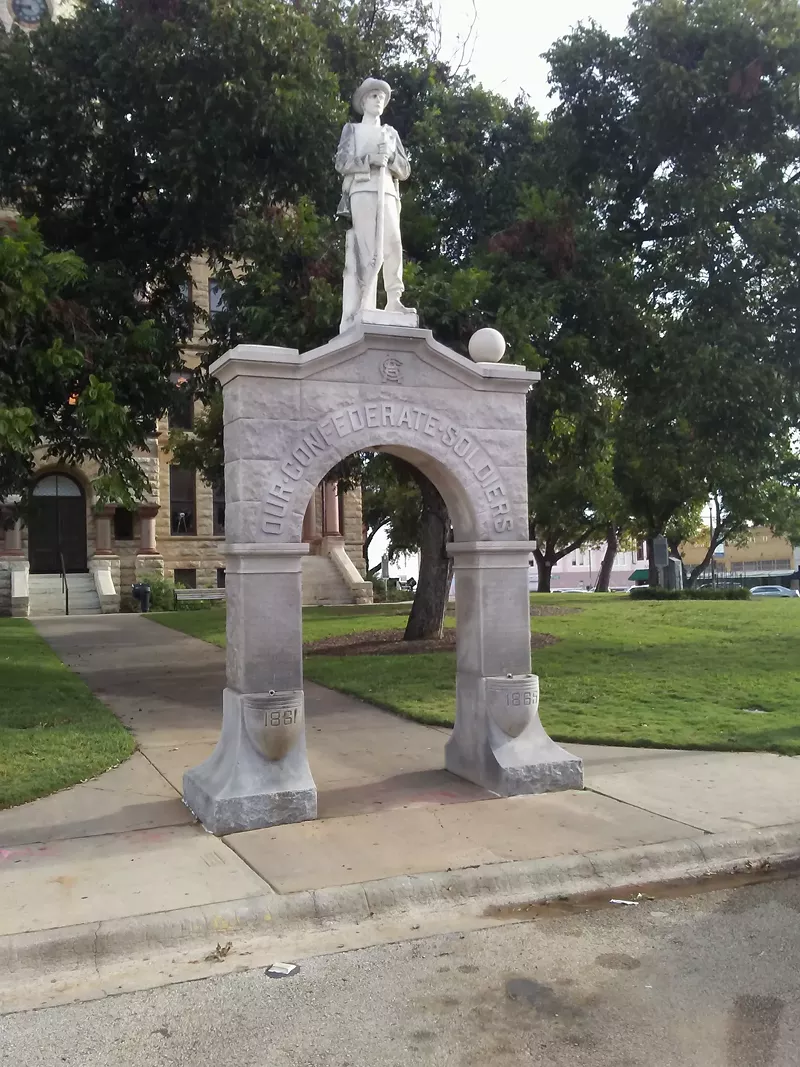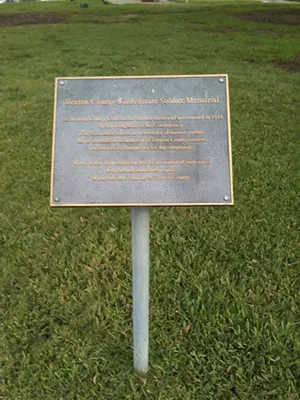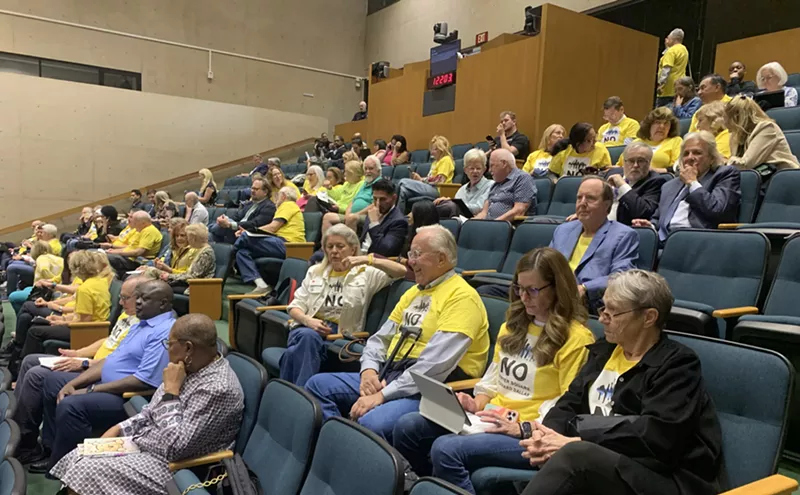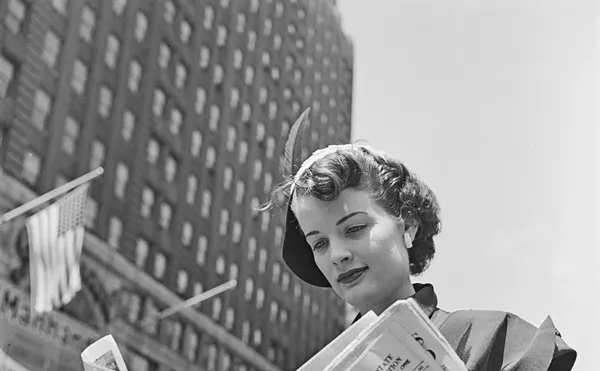A Confederate soldier statue has been overlooking the south side of the square in Denton for nearly 100 years. The young man, perhaps in his 20s, has a clean-shaven face and holds a rifle. He’s faded with age, and what looks like black mold grows on his coat jacket and the back of his farmer’s hat.
The statue stands atop a stone archway that the Daughters of the Confederacy erected in 1918 on the courthouse lawn. The words “our Confederate soldiers” are etched into the stone underneath him. The group commissioned the statue as a way to honor the Confederate soldiers from Denton County who “in a heroic self-sacrifice and devoted loyalty gave their manhood and their lives to the South in her hour of need.”
But the reality is most didn’t have much of a choice. They were drafted to fight. The Confederate congress passed a conscription act in 1862 and began drafting men. The first to go were between 18 and 35, but later conscripts were between 17 and 50. The rules exempted government officials, railroad workers, clergymen and schoolteachers — as well as slaveholders with more than 20 slaves.
“Some of the richest counties in Texas contributed the fewest men to the fighting,” according to The American Civil War: Texas Conscription by the Texas State Library and Archives Commission. “The burden fell heaviest on small farmers, whose families were often left indigent when the men departed.”
As Confederate monuments are removed throughout the South, many people in Denton County still support the old Confederate soldier statue on the courthouse lawn.
“The only complaints I’ve ever seen about it were from the Dentonite," a local blog that covers mostly entertainment, said Joseph Kane, the Denton County Republican Party chairman for Precinct 1013. Kane has been defending himself against online attacks by an anti-Trump group that claims he's a white supremacist because Nazis are following him on social media and liking his tweets. He also follows some self-proclaimed adherents to the "alt-right," a white nationalist movement, and anti-Muslim nationalists.
But the Dentonite isn’t the only one complaining. Willie Hudspeth has been appearing before the Denton County Commissioners Court since the late '90s, trying to get the Confederate monument removed from the courthouse lawn. Hudspeth, a black man in his early 70s, runs an old junk shop on the corner of Oak and Bonnie Brae streets and serves as the president of Denton’s NAACP.
Hudspeth, a Vietnam War veteran, recently picked up his protest sign again after a white nationalists demonstration in front of a Confederate monument in Charlottesville, Virginia, erupted in violence, leaving three people dead and more than two dozen injured. He plans to protest the Confederate monument on the courthouse lawn every Sunday evening and appear in commissioners court every Tuesday morning to request that they put its removal on the agenda.
The commissioners "don’t want the backlash like Trump is getting right now,” Hudspeth said, “so they just don’t want to say anything.”
Some commissioners may have to leave office before the request is fulfilled. Hudspeth's biggest opponent is Denton County Judge Mary Horn, who has kept the issue at bay. Horn has told the Denton Record-Chronicle that if the commissioners put the removal of the Confederate monument on the agenda, they would hold court from 9 a.m. to midnight to discuss an issue she considers “superfluous.”
Horn has claimed that the Courthouse on the Square and its surrounding property are considered a museum and can't be changed. The Texas Historical Commission's director of community heritage development reported to commissioners in 2000 that the Confederate monument was "historic" and part of the courthouse lawn. Horn says various restoration experts have indicated moving the monument would damage it.
Commissioners met with Hudspeth in 2010 and decided to replace a previous plaque with one explaining why the memorial was erected. It partially reads: “Now, let this be a testimony that God created all men equal with certain inalienable rights. We are all one, citizens of Denton County.” Hudspeth said he never approved the wording.
At commissioners court meeting Tuesday morning, Hudspeth appeared with two other people demanding the removal of the Confederate monument from the courthouse lawn.
“We need to face the fact that the South was treasonous,” Alfred Sanchez said. “We fought to preserve peace, but these [Confederate] soldiers fought to preserve racism.”
Hudspeth appeared before commissioners in a red T-shirt with the picture of a grave and a headstone that read, “R.I.P. Racism.” He held the front page of a newspaper with a picture of a white supremacist in Charlottesville driving his car through a crowd of counterprotesters.
“Hate is coming back again," he said.
The protester says he plans to run for Horn's seat; the judge doesn't plan to run for reelection.
“I’ve decided that I’m going to run for office for the judge as an independent,” he said. “I just want to talk about what we all need to do to come together.”

Audio By Carbonatix
[
{
"name": "GPT - Billboard - Slot Inline - Content - Labeled - No Desktop",
"component": "21721571",
"insertPoint": "2",
"requiredCountToDisplay": "2"
},{
"name": "STN Player - Float - Mobile Only ",
"component": "21861991",
"insertPoint": "2",
"requiredCountToDisplay": "2"
},{
"name": "Editor Picks",
"component": "17105533",
"insertPoint": "4",
"requiredCountToDisplay": "1"
},{
"name": "Inline Links",
"component": "18349797",
"insertPoint": "8th",
"startingPoint": 8,
"requiredCountToDisplay": "7",
"maxInsertions": 25
},{
"name": "GPT - 2x Rectangles Desktop, Tower on Mobile - Labeled",
"component": "22608066",
"insertPoint": "8th",
"startingPoint": 8,
"requiredCountToDisplay": "7",
"maxInsertions": 25
},{
"name": "Inline Links",
"component": "18349797",
"insertPoint": "8th",
"startingPoint": 12,
"requiredCountToDisplay": "11",
"maxInsertions": 25
},{
"name": "GPT - Leaderboard to Tower - Slot Auto-select - Labeled",
"component": "17357520",
"insertPoint": "8th",
"startingPoint": 12,
"requiredCountToDisplay": "11",
"maxInsertions": 25
}
]













